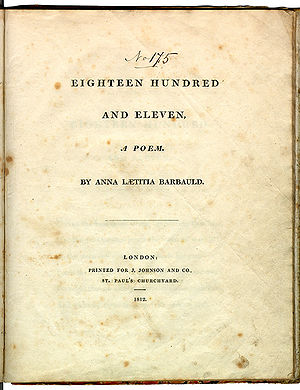
Eighteen Hundred and Eleven
Encyclopedia

1812 in poetry
Nationality words link to articles with information on the nation's poetry or literature .-United Kingdom:, which criticized Britain's participation in the Napoleonic Wars* Lord Byron:** The Curse of Minerva...
) is a poem by Anna Laetitia Barbauld
Anna Laetitia Barbauld
Anna Laetitia Barbauld was a prominent English poet, essayist, literary critic, editor, and children's author.A "woman of letters" who published in multiple genres, Barbauld had a successful writing career at a time when female professional writers were rare...
criticizing Britain's participation in the Napoleonic Wars
Napoleonic Wars
The Napoleonic Wars were a series of wars declared against Napoleon's French Empire by opposing coalitions that ran from 1803 to 1815. As a continuation of the wars sparked by the French Revolution of 1789, they revolutionised European armies and played out on an unprecedented scale, mainly due to...
.
Britain
United Kingdom of Great Britain and Ireland
The United Kingdom of Great Britain and Ireland was the formal name of the United Kingdom during the period when what is now the Republic of Ireland formed a part of it....
had been at war with France
France
The French Republic , The French Republic , The French Republic , (commonly known as France , is a unitary semi-presidential republic in Western Europe with several overseas territories and islands located on other continents and in the Indian, Pacific, and Atlantic oceans. Metropolitan France...
for a decade and was on the brink of losing the Napoleonic Wars, when Barbauld presented her readers with her shocking Juvenal
Juvenal
The Satires are a collection of satirical poems by the Latin author Juvenal written in the late 1st and early 2nd centuries AD.Juvenal is credited with sixteen known poems divided among five books; all are in the Roman genre of satire, which, at its most basic in the time of the author, comprised a...
ian satire. She argued that the British empire was waning and the American empire was waxing. It is to America that Britain’s wealth and fame will now go, she contended, and Britain will become nothing but an empty ruin. She tied this decline directly to Britain’s participation in the Napoleonic Wars:
- And think’st thou, Britain, still to sit at ease,
- An island Queen amidst thy subject seas,
- While the vext billows, in their distant roar,
- But soothe thy slumbers, and but kiss thy shore?
- To sport in wars, while danger keeps aloof,
- Thy grassy turf unbruised by hostile hoof?
- So sing thy flatterers; but, Britain, know,
- Thou who hast shared the guilt must share the woe.
- Nor distant is the hour; low murmurs spread,
- And whispered fears, creating what they dread;
- Ruin, as with an earthquake shock, is here (lines 39–49)
This pessimistic view of the future was, not surprisingly, poorly received; “reviews, whether in liberal or conservative magazines, ranged from cautious to patronizingly negative to outrageously abusive.” Barbauld, stunned by the reaction, retreated from the public eye; in fact, she never published another work within her lifetime. Even when Britain was on the verge of winning the war, Barbauld could not be joyous. She wrote to a friend: “I do not know how to rejoice at this victory, splendid as it is, over Buonaparte [sic], when I consider the horrible waste of life, the mass of misery, which such gigantic combats must occasion."
Everard Green noted that "In her own time, the idea that the United States - then still mainly reckoned a minor and peripheral power - would one day eclipse the mighty British Empire was greeted with scorn. Indeed, at the time when the poem was written, Britain was yet to reach its zenith as a world power. Yet what Barbauld predicted did come to pass, though very much later - not due to the Napoleonic Wars, but due to the Second World War."

